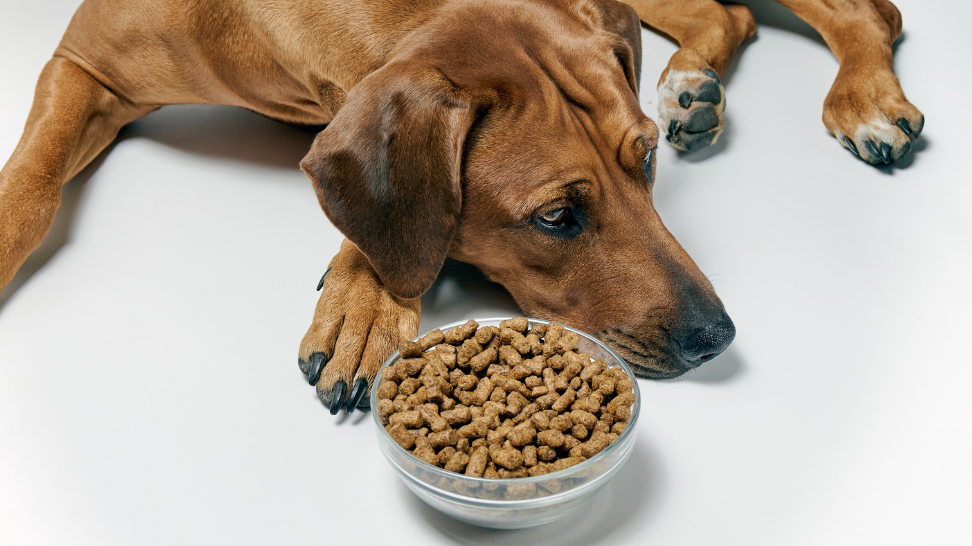Is your dog suddenly refusing to eat at mealtime? We understand how frustrating it can be when our four-legged pals don’t seem interested in their food. But don’t worry, we’re here to help you figure out what’s causing your dog’s appetite loss and give you some recommendations that will have them wagging their tail again at mealtime. In this post, we’ll look at the most frequent reasons for appetite loss in dogs, when you should see a vet, and how you can encourage your dog to eat.
Common Reasons for Loss of Appetite in Dogs
The first step in helping your dog regain their appetite is understanding why they aren’t eating. Let’s look at the most common reasons your dog may be losing interest in eating.
- Injury or Illness: A dog’s lack of appetite can sometimes be an indication of an underlying health problem. Infections, dental problems, or digestive issues may make eating difficult or unpleasant for your dog. Keep an eye on your pet’s behavior and overall health to spot any problems that could be affecting their appetite.
- Behavioral Issues: Dogs, like people, can experience anxiety or stress, which can lead to a reduction in appetite. Changes in their routine or surroundings might be the source of the problem. Be attentive to any changes in your dog’s behavior and try to reduce stress to make them feel more at ease around meals.
- Age-related Factors: As our pets age, their senses of smell and taste may deteriorate, making food less appetizing. Dental problems in senior dogs can also make chewing their food difficult. You can make mealtime enjoyable for your senior dog by offering soft or moist food along with providing good dental care.
- Poor Quality or Unappealing Food: Dogs, like humans, can become bored with their food or simply dislike the flavor. Your dog may turn up their nose at mealtime if the food is stale, expired, or of poor quality. To keep your dog interested in their meals, provide a range of high-quality, nutritious options.
When Should You See a Veterinarian?
Knowing when to seek expert assistance is vital in dealing with your dog’s loss of appetite. Let’s go over some indicators that it’s time to see your veterinarian.
A sudden or prolonged lack of appetite could suggest an underlying health problem. If your dog’s lack of appetite persists for more than a day or two, you should visit your veterinarian. Other red flags include dehydration, weight loss, and other symptoms such as lethargy, vomiting, or diarrhea. Remember that your veterinarian is the most reliable source of information on your dog’s health!
Tips for Encouraging Your Dog to Eat
Now that we’ve discussed the causes of appetite loss and when to visit a veterinarian, let’s look at some helpful methods for getting your dog to eat.
- Rule out medical issues: Always see your vet first to rule out any medical problems that may be affecting your dog’s appetite. Your veterinarian can advise and treat your dog to help him feel better and regain his appetite.
- Establish a regular eating schedule: Dogs thrive on consistency, so keep feeding times steady and try to limit interruptions. Maintaining a consistent routine will help your dog feel secure and comfortable around meals.
- Gradually transition to new food if necessary: If you’re changing your dog’s diet, do it slowly, mixing new and old food over several days to prevent upsetting your dog’s stomach. This gradual transition can help your dog adjust to new flavors and textures, increasing their likelihood of accepting the new food.
PawCo’s Vegan Dog Food: A Solution for Picky Eaters
If your dog is still refusing to eat, consider trying PawCo’s vegan dog food. Our specifically formulated dog food offers numerous benefits, including improving digestion and satisfying your dog’s taste buds.
Our vegan dog food was created by board-certified food scientists and animal nutritionists to be complete, balanced, and kind to your dog’s digestive tract. In our taste test, dogs normally fed animal-based diets enthusiastically consumed our plant-based food over two days, indicating their enjoyment and satisfaction with our product.
In fact, a study by Dr. Andrew Knight, showed that vegan pet food is generally at least as palatable to dogs as traditional, meat-based meals. The study states, “There was no consistent evidence of a difference between vegan diets and either the conventional or raw meat diets.”
Choose from flavors like Green Mix & Carrots, Pumpkin & Cranberries, Blueberries & Veggies, and Peanut Butter & Apple to make your dog happy. By introducing PawCo’s vegan dog food to your dog’s diet, you’ll provide a nutritious and delicious choice while encouraging a more sustainable lifestyle.
Conclusion
Understanding the causes of your dog’s loss of appetite is crucial for reviving their appetite. By consulting with your veterinarian, implementing provided tips, and considering a switch to PawCo’s vegan dog food, you can help ensure your dog’s happiness and health during mealtime. PawCo is here to help you and your pet on your path to a more sustainable and fulfilling diet. Good luck with your feeding!
